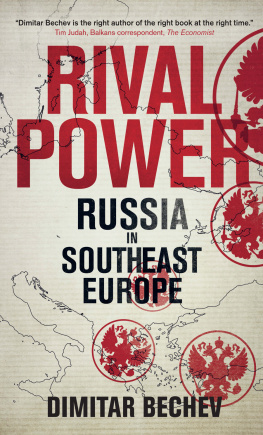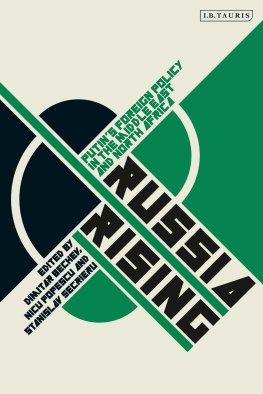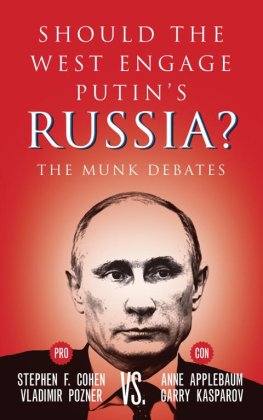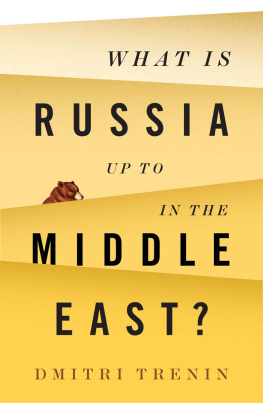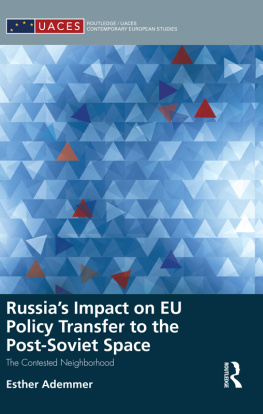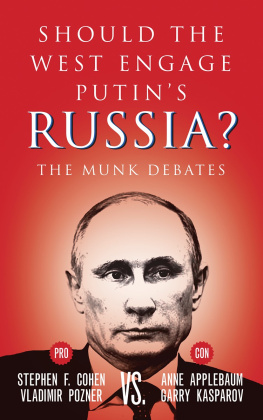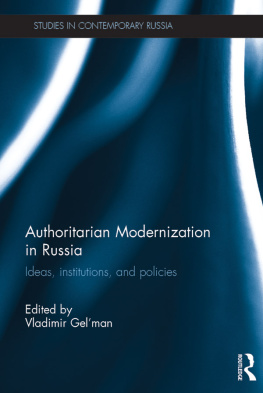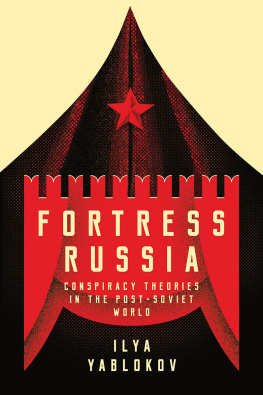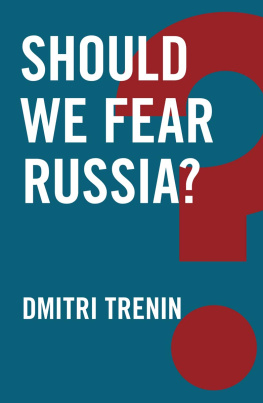Praise for
RIVAL POWER
It would be good to say that this book is a valuable addition to the canon. It is not. When it comes to the issue of Russia, the Balkans, and the wider region of Southeastern Europe, it is the canon, because no one else has written about it. Dimitar Bechev is the right author of the right book at the right time.
Tim Judah, Balkans correspondent, The Economist
For the new Great Game of geopolitical competition, look above all to the Balkans, a region where the impact of Russian energy, soft power, and covert operations are all at their strongest. This excellent book is the best primer yet to this unfolding struggle; a scholarly, sympathetic, and realistic analysis of the present situation and likely future developments that deserves to be read widely and carefully.
Mark Galeotti, head of the Center for European Security,
Institute of International Relations, Prague
Russia is back in the Balkans and ideology has little to do with it. In this engaging book, Dimitar Bechev argues that revival of Russias influence in the region was made possible by its pragmatism and tough-minded pursuit of material gains. Those viewing Russia as the new ideological warrior will be challenged in their beliefs.
Andrei P. Tsygankov, professor of international relations,
San Francisco State University
This timely and insightful analysis takes the Russian challenge to the stability of Southeast Europe seriously, and shows its limitations, despite the abundant opportunities created by local miscreants.
Pavel Baev, Nonresident Senior Fellow, Brookings Institution,
and Research Professor, Peace Research Institute, Oslo
At the time when it is fashionable to sound alarmist on Russias return to the Balkans, Rival Power provides a clear-eyed assessment of the opportunities and significant limits for Russias power in the region.
Vladimir Frolov, foreign affairs columnist, Republic.ru
Once written off as a fading actor in a region ever more integrated with the EU, Russia is now playing an increasingly disruptive role in Southeast Europe. Drawing on his innate understanding of the area, and an unmatched knowledge of the regions languages, Dimitar Bechev looks beyond the stereotypical explanations for this Russian resurgence and investigates the hard political calculations at play. This is a truly excellent, and highly readable, account of how Moscow is trying to extend its influence across the Balkans, Greece, Cyprus, and Turkey.
James Ker-Lindsay, Senior Visiting Fellow, London School of
Economics and Political Science
Dimitar Bechevs book possesses the rare quality of being the work of a seasoned and insightful scholar, but also of someone who appreciates the exciting twists and turns of Russias dramatic relationship with the Balkans. Rival Power is very well written and dispenses with several persistent myths, especially one that views countries of the region and their leaders as victims of Moscows preying. A thrilling and stark expos of Russias masterful use of a limited political arsenal to further its goals.
Konstantin Eggert, commentator and host, TV Rain, Moscow
Rival Power is a very timely and comprehensive book, written by one of the most accomplished observers of the international relations of the Russian Federation since its inception. It is written in a concise and clear language, masterfully relaying the gradual reemergence of Russia as a new (old) challenge to the West in the Balkans and the Black Sea. A must reading for those who wish to make sense of the recent developments in international politics.
Mustafa Aydn, professor at Kadir Has University, Istanbul
Dimitar Bechevs groundbreaking work on Southeast Europe vividly demonstrates how Vladimir Putin exploits the Wests distractions. This book documents a revisionist Kremlins efforts to disrupt the reform and integration process in the Western Balkans, and in turn sow doubts about the future of the European project and US leadership. Bechevs research also makes clear that Russia offers no viable alternative to the European Union and United States in Southeast Europe, while serving as a warning that, if left unchecked, Russian mischief-making could lead to conflict in the region.
Damon Wilson, executive vice president of the Atlantic Council
In times when conspiracy theories are in full blossom, this is a sober, historically informed, cogently argued, and well-documented analysis of Russias influence in Southeast Europe. Very much worth reading.
Loukas Tsoukalis, professor of European integration, University
of Athens, and president of the Hellenic Foundation
for European and Foreign Policy

Copyright 2017 Dimitar Bechev
All rights reserved. This book may not be reproduced in whole or in part, in any form (beyond that copying permitted by Sections 107 and 108 of the U.S. Copyright Law and except by reviewers for the public press) without written permission from the publishers.
For information about this and other Yale University Press publications, please contact:
U.S. Office:
Europe Office:
Set in Minion Pro by IDSUK (DataConnection) Ltd
Printed in Great Britain by TJ International Ltd, Padstow, Cornwall
Library of Congress Control Number: 2017943875
ISBN 978-0-300-21913-5
A catalogue record for this book is available from the British Library.
10 9 8 7 6 5 4 3 2 1
To my children, Emanuil, Anthony, and Sophia
CONTENTS
The Balkans Rediscovered: Russia and the Breakup
of Yugoslavia
Meddling in Europes Backyard: Russia and the
Western Balkans
MAPS AND FIGURES
Maps
Figures
ACKNOWLEDGMENTS
This book is the product of more than three years of work. It was originally conceived after a research trip to Moscow in May 2013 that I took with a co-conspirator, Andrew Wilson, at the time we shared an affiliation with the European Council on Foreign Relations. Although our report on the decline of Gazprom never saw the light of day, much of the content ultimately found its way into Andys masterful account of the Ukraine crisis and, now, in this volume. The idea of writing a book on Russia in Southeast Europe picked up speed only in the watershed moment that was the spring and summer of 2014. In the process of conducting research and drafting the text, I benefited from the incredible hospitality of a number of institutions, drawing vast amounts of knowledge and inspiration from fellow scholars across disciplines.
The project began in earnest in the academic year of 201415, which I spent as a fellow at LSEE, the unit at the London School of Economics specializing in the politics and economics of Southeast Europe. I owe a special debt to James Ker-Lindsay, Tena Prelec, and to Spyros Economides (who, many moons ago, examined my DPhil thesis at Oxford). Exceptionally kind hosts as well as dear friends, they all helped me reinvent myself as an academic, following a stint in the policy world. Together with James and Othon Anastasakis of Southeast European Studies at Oxford (SEESOX), a program with which I was affiliated between 2002 and 2009, I had the pleasure to co-convene a conference on Russias involvement in the Balkans.
The bulk of the writing was done at Harvard University, where I spent more than a year at the Center for European Studies. I am grateful to Elaine Papoulias, a long-time friend who shares my passion for the politics of Turkey and the Balkans, to the CES director Grzegorz Ekiert, and to all fellows of the center whose generosity was only matched by their intellectual depth. My gratitude extends also to the Davis Center for Russian and Eurasian Studies, whose seminar series provided an excellent opportunity to present my work. Many thanks to Mark Kramer, Rawi Abdelal, and to Lenore Martin who tirelessly co-pilots the Turkish Studies Seminar, as well as to the Post-Communist Politics Working Group, especially Dmitry Gorenburg and Nadiya Kravets. At Harvard, I was privileged to get to know Joseph Nye whose scholarship I have admired since my undergraduate days and who helped sharpen my thinking about the project I had embarked upon. Last but not least, I am thankful to the Center for Slavic, Eurasian, and East European Studies at the University of North Carolina-Chapel Hill, and particularly to Milada-Anna Vachudov and Adnan Dumhur.
Next page
